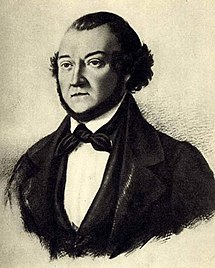music.wikisort.org - Composer
Alexander Aleksandrovich Alyabyev (Russian: Алекса́ндр Алекса́ндрович Аля́бьев; 15 August [O.S. 4 August] 1787 – 6 March [O.S. 22 February] 1851), also rendered as Alabiev or Alabieff, was a Russian composer known as one of the fathers of the Russian art song. He wrote seven operas, twenty musical comedies, a symphony, three string quartets, more than 200 songs, and many other pieces.
This article may be expanded with text translated from the corresponding article in Russian. (March 2020) Click [show] for important translation instructions.
|

Biography
Born to a wealthy family of Governor Alexander Vasilievich Alyabyev in Tobolsk in Siberia, Alyabyev learned music in his early years. He joined the Russian Army in 1812, during the Napoleonic War, and fought as an officer until 1823. He participated in the entry of the Russian forces into Dresden and Paris,[1] and he won two awards.
In February 1825 Alyabyev and three others took part in an all-night card game which ended with retired colonel T.M. Vremev being accused of cheating and struck first by Alyabyev and then also by the two other players. The colonel died a few days later, possibly from a ruptured spleen, and Alyabyev was arrested on a charge of murder. While the evidence was not conclusive, Tsar Nicholas I expressly ordered him into exile to his native town of Tobolsk. Freed in 1831, he spent some years in the Caucasus before returning to Moscow, where he died in 1851.[1]
The Nightingale and other songs
Alyabyev's most famous work is The Nightingale (Соловей), a song based on a poem by Anton Delvig. It was composed while Alyabyev was in prison, in 1825. It has entered Russian consciousness as akin to a folk song.
The song became more widely known after having been introduced into Rosina's singing lesson scene in Gioachino Rossini's The Barber of Seville by Pauline Viardot, followed by Adelina Patti and Marcella Sembrich.
Mikhail Glinka wrote piano variations based on the song, as did Mily Balakirev.[1] Franz Liszt also wrote a transcription of it (S. 250/1).
It was one of Pyotr Ilyich Tchaikovsky's favourite songs from his earliest childhood, as his mother often sang it to him.[2]
Other songs by Alyabyev include "Ja vizhu obraz" (I See Your Image), "Ja vas ljubil" (I Loved You), "Uvy, zachem ona blistajet" (Alas, Why is She so Radiant) and "Nishchaja" (The Beggar).
Compositions
- The Village Philosopher (vaudeville, with Alexey Verstovsky and Maurer, 1823)
- The Nightingale (1827)
- The Mermaid and the Fisherman (opera, 1842)
- Ammalat-Bek (opera, 1843–47)
- A Prisoner in the Caucasus (opera, 1845)
- Morning and Evening (vaudeville)
- Moonlit Night, or The House Spirits (opera)
- Celebration of Muses (which opened the Bolshoi Theatre (1825)
- The Magic Drum, or the Sequel to The Magic Flute (ballet)
- incidental music to Shakespeare's The Merry Wives of Windsor
- incidental music to Shakespeare's A Midsummer Night's Dream
- three string quartets
- Three Tens, or The New Two Day Adventure
- Piano Trio in E-flat major (1815), unfinished
- Piano Trio in A minor (1834), in 3 movements: I. Allegro ma non troppo, II. Adagio, III. Rondo: allegretto
References
- Grove's Dictionary of Music and Musicians, 5th ed, 1954, Vol. I, p. 85, Alabiev, Alexander Alexandrovich]
- Alexander Poznansky, Tchaikovsky: The Quest for the Inner Man, pp. 7, 16
External links
- Walker, William Thomas (March 2002). "The Artaria String Quartet at UNC: Who's on First? (Account of a performance of one of Alyabyev's string quartets)". Classical Voice of North Carolina. Retrieved 2009-01-27.
- "Musical Tales: Three Alexanders". The Voice of Russia. July 28, 2005. Archived from the original on April 17, 2013. Retrieved 2011-12-07.
- "Alyabyev Biography at Bashedu.ru" (in Russian). Archived from the original on April 10, 2008. Retrieved 2009-01-27.
- "ALYABIEV - russian composer (chamber vocal music - art songs, lieder)". RUVO-classic Artists Management. 2000. Archived from the original on 2009-06-12. Retrieved 2009-01-27.
- Free scores by Alexander Alyabyev at the International Music Score Library Project (IMSLP)
- Free scores Mutopia Project
- Free scores by Alexander Alyabyev in the Choral Public Domain Library (ChoralWiki)
На других языках
[de] Alexander Alexandrowitsch Aljabjew
Alexander Alexandrowitsch Aljabjew (russisch Александр Александрович Алябьев; * 4.jul. / 15. August 1787greg. in Tobolsk; † 22. Februarjul. / 6. März 1851greg. in Moskau) war ein russischer Komponist.- [en] Alexander Alyabyev
[es] Aleksandr Aliábiev
Aleksandr Aleksándrovich Aliábiev (en ruso, Александр Александрович Алябьев) (Nació el 4 [15][1] de agosto de 1787 en Tobolsk- Murió el 22 de febrero [6 de marzo][2] de 1851 en Moscú) fue un compositor ruso, pianista y director de orquesta. En el siglo XIX adquirió mucha fama, escribió aproximadamente 200 romances, 6 óperas, 20 comedias musicales, entre otras obras. Su obra más reconocida es ``El ruiseñor´´, un romance basado en un poema de Antón Délvig (1826).[ru] Алябьев, Александр Александрович
Алекса́ндр Алекса́ндрович Аля́бьев (4 [15] августа 1787, Тобольск — 22 февраля [6 марта] 1851, Москва) — русский композитор, пианист, дирижёр.Другой контент может иметь иную лицензию. Перед использованием материалов сайта WikiSort.org внимательно изучите правила лицензирования конкретных элементов наполнения сайта.
WikiSort.org - проект по пересортировке и дополнению контента Википедии